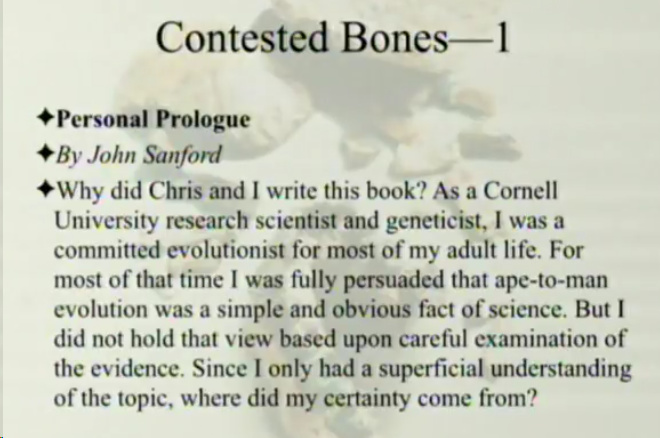I’m looking for any papers, blog posts, news articles, etc. that lay out the genetic evidence for human-ape ancestry. From the most compelling to least compelling. I’m just trying to build a nice reference folder. Thanks!
Still my favorite outside of ERVs:
Any good links to ERV stuff?
On that specific topic you could look at
Rupe, C. and J. Sanford. 2017. Contested Bones. FMS publications. ISBN #9780981631684 2. https://www.contestedbones.org
And there is a good in depth discussion of the book on Youtube.

Naw. I’m looking for resources on the molecular evidence of human-ape ancestry. Not paleontological. Also, my training has been in paleontology. I know and understand the human fossils record better than they do
Both the Smithsonian and the AMNH have sections devoted to human evolution. Those seem good resources at the lay level. The most recent big news in ape/hominid genomics was in Science last summer. Evan Eichler is one of the leads of that group and it would make sense to follow his work. More general resources on comparative genomics should be easy to find here at BL and would include ERVs and the chromosome 2 fusion story.
Similar to ERVs-
From paper:
Large-scale sequencing studies of primate genomes have provided a great deal of detail on the evolution of Alu elements. Because there is no specific mechanism for removal of Alu insertions, Alu evolution is dominated by the accumulation of new Alu inserts… Comparisons between chimpanzee and human genomes have shown that, since their divergence about 6 million years ago, there have been about 2,400 and 5,000 lineage-specific insertions fixed, respectively.
And yet we have over a million of these that without common descent just so happened to be placed in the same location in the genome.
Here’s a good lay-level summary of the paper, also from Science: High-quality genomes reveal new differences between the great apes
Added note: I forgot to paste these nuggets from the article, which seem to me to have implications for Behe’s recent book and, in the long term, for all evolution deniers:
One reason why structural variation is important, particularly on the short evolutionary timescale that separates humans and other great apes, is that it provides a way for genomes to evolve rapidly. When a whole chunk of DNA is removed or duplicated, its molecular function can be inhibited or enhanced in one step, rather than through successive mutations at individual bases. Indeed, much of the great-ape genome seems to be modular in nature, and is therefore susceptible to the kind of building-block alteration that structural variation allows. It is also thought that gene loss is a key mechanism for evolutionary change. This might seem counterintuitive, but genes often act to constrain, rather than promote, a particular function. Disabling them by removing, duplicating or relocating a chunk of DNA might be the simplest way to confer beneficial effects.
Intriguing as Kronenberg and colleagues’ findings are, there is also a broader significance to their work. Several groups and consortia are applying new sequencing technologies to different organisms. Ultimately, researchers want accurate, high-resolution assemblies for all species, and to compare these genomes on an equal footing. This will improve evolutionary analyses and reveal complex mutation processes that have hitherto been obscured. Large genome assembly currently remains hugely expensive, and even state-of-the-art sequencing tools struggle to resolve repetitive sequences on scales above a few hundred thousand base pairs, making assembly of certain genomes challenging. But tools to read whole genomes with negligible errors on inexpensive hardware are not far away, and are almost available for small bacterial genomes. It is clear that we are leaving behind the initial period of evolutionary genomics, in which analyses involved comparing a genome of interest to a few ‘gold standard’ genomes, such as human, mouse or zebrafish. Instead, we are moving towards a more complete and equable genomic view of life.
I sure hope so, if you expect to earn that Ph.D.!
Always lame to quote yourself, but just to further the conversation, it seems to me that many evolution deniers rely on intuition – indeed, play to intuition, as with Doug Axe’s book Undeniable – when much of reality/actual biology is counterintuitive.
This topic was automatically closed 3 days after the last reply. New replies are no longer allowed.
